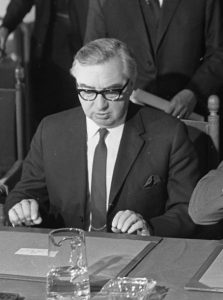Recalling those days one is not only impressed, but almost oppressed, with the sense of how many issues we were faced with and had to handle at the same time.[i]
When George Brown stormed out of Downing St in the early hours of 15 March 1968, it was not the first time he had threatened to resign. On this occasion the trigger was his allegation that he had been deliberately excluded from an emergency ministerial meeting called in response to an American request to close the London foreign exchange market during an international gold crisis. His intemperate outburst in front of other ministers, accusing Labour Prime Minister Harold Wilson of lying, crossed a line. This time he did not retract his resignation, and this time Wilson accepted it.

Wilson and Brown later gave very different versions of the events of 14 to 15 March: the Prime Minister asserting that all present agreed Brown’s behaviour was intolerable; the Foreign Secretary accusing Wilson of taking decisions in a ‘presidential’ fashion over the heads of ministers.[ii] Wilson’s canny but manipulative prime ministerial style is well-documented, as well as his habit of relying on a small group of advisers including Marcia Williams. George Brown’s mercurial temperament, sometimes exacerbated by alcohol, is also well-known: as Denis Healey put it, ‘when he was good he was very good, but when he was bad he was horrid’, though Foreign Office officials, according to Sir Denis Greenhill, found they could forgive his ‘instability, intolerance and cruelty’ because of his ‘undoubted brilliance and the rightness of many of his policy aims’.[iii]
Nevertheless, Wilson and Brown were men of exceptional ability who had worked together for years, successfully if not always harmoniously. Wilson appreciated Brown’s talents and judgement, and Brown recognised Wilson’s toughness and skill in leading Labour to victory in 1964 and to re-election with an increased majority in 1966, keeping a fractious Cabinet of ‘big beasts’ together. So why did the break come on 15 March? Loss of patience and mutual exasperation played a part: but a snapshot of the wider context indicates that the responsibilities of power and problems of policy faced by the two men were also a key element in what happened.

It’s the economy ...
A combination of the effects of devaluation of sterling in November 1967, the aftermath of the Arab-Israeli war of June 1967 (including the closure of the Suez canal) and a growing US balance of payments deficit exacerbated by the costs of the Vietnam war, led directly to the gold crisis of March 1968 and presented the British government with difficult policy choices. In January the Cabinet had to accept a tough package of cost-cutting measures drawn up by Chancellor of the Exchequer Roy Jenkins.[iv] Brown found some of these hard to accept, particularly since defence cuts were opposed by the US government who gave him a hard time in Washington. Britain could not sustain a large military presence in the Far East and Middle East as well as Europe without financial help from the US. But the Americans, mired in an escalating and apparently unwinnable war in South East Asia, were reluctant to bail the British government out again, though they still looked for (and got) British support in the gold crisis.
The Prime Minister, under pressure from the Labour Party and TUC to dissociate Britain from US policy in Vietnam, was also under American pressure to continue his mediation efforts in Moscow to get the Soviets to exert pressure on Hanoi, as well as on North Korea (who had recently seized a US ship). The Foreign Secretary, though keen to keep the Americans onside, favoured a tougher approach with the Russians at a time when KGB activities in Britain were increasingly blatant and the sincerity of the Soviet approach questionable. The Soviet Union, working hard to re-establish its prestige in the Middle East after the 1967 war, encouraged Arab feeling that the British were in the US camp, supplying arms to the region and increasing the Soviet naval presence in the Mediterranean, all posing a strategic threat to British interests.
George Brown’s appointment as Foreign Secretary in August 1966 had been seen as a signal that Britain would make a serious attempt to engage with Europe, but the second application to join the EEC was rejected in late 1967; among the reasons given were Britain’s economic problems and the closeness of Anglo-American relations. In wider Europe, a Soviet wedge-driving operation was underway, engaging with West Germany’s Ostpolitik and proposing a European security conference, while tightening the Soviet grip on East Germany, rejecting any idea of unification and engaging in an aggressive espionage campaign in Britain and on the European continent. Meanwhile, the US complained that European members of NATO were not contributing enough to their own defence.
Britain’s relations with China remained stormy after the sacking of the British Embassy in Peking in August 1967; a civil war was under way in Nigeria, the enforcement of sanctions against Ian Smith’s regime in Southern Rhodesia was both difficult and expensive. Wilson had only just managed to heal a damaging Cabinet split in December 1967 over the supply of arms to South Africa; while a large increase in the number of Kenyan Asians entering Britain caused problem for Harold Wilson on both the foreign policy and domestic front.
These are only some of the foreign policy issues facing George Brown and Harold Wilson in March 1968. But Prime Ministers are responsible for domestic problems too, and Wilson had many on his plate: splits in the Parliamentary Labour Party; industrial unrest; an outbreak of foot and mouth disease; and a resurgent Conservative Party under Edward Heath ready and willing to capitalise on all Labour’s difficulties. Both Wilson and Brown had plenty to be tired and emotional about in the small hours of 15 March 1968: it is hardly surprising that the strain proved too much for one of them.
[i] George Brown, In My Way (London: Victor Gollancz, 1971), p. 140.
[ii] See Brown, In My Way; and Harold Wilson, The Labour Government 1964-70: A Personal Record (London: Weidenfeld & Nicolson, 1971).
[iii] Denis Healey, The Time of My Life (London: Michael Joseph, 1989), p. 297; Denis Greenhill, More by Accident (York: Wilton 65, 1992), p. 133.
[iv] See Gill Bennett, Six Moments of Crisis: Inside British Foreign Policy (Oxford: OUP, 2013), Chapter 4.
Keep tabs on the past. Sign up for our email alerts.